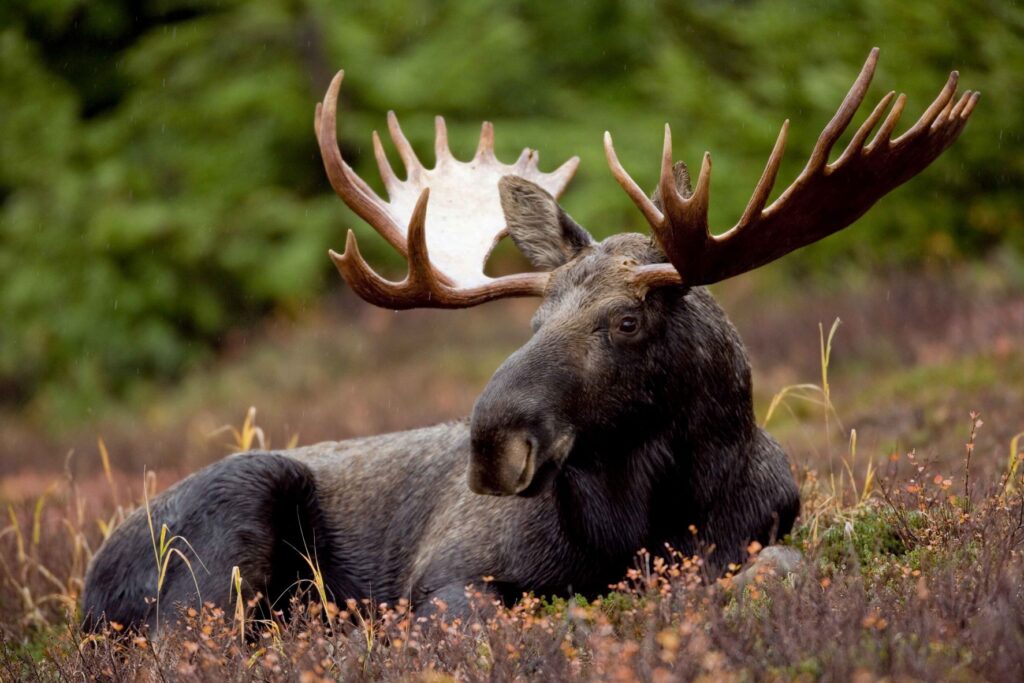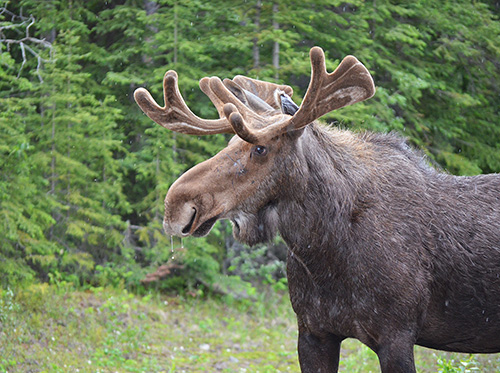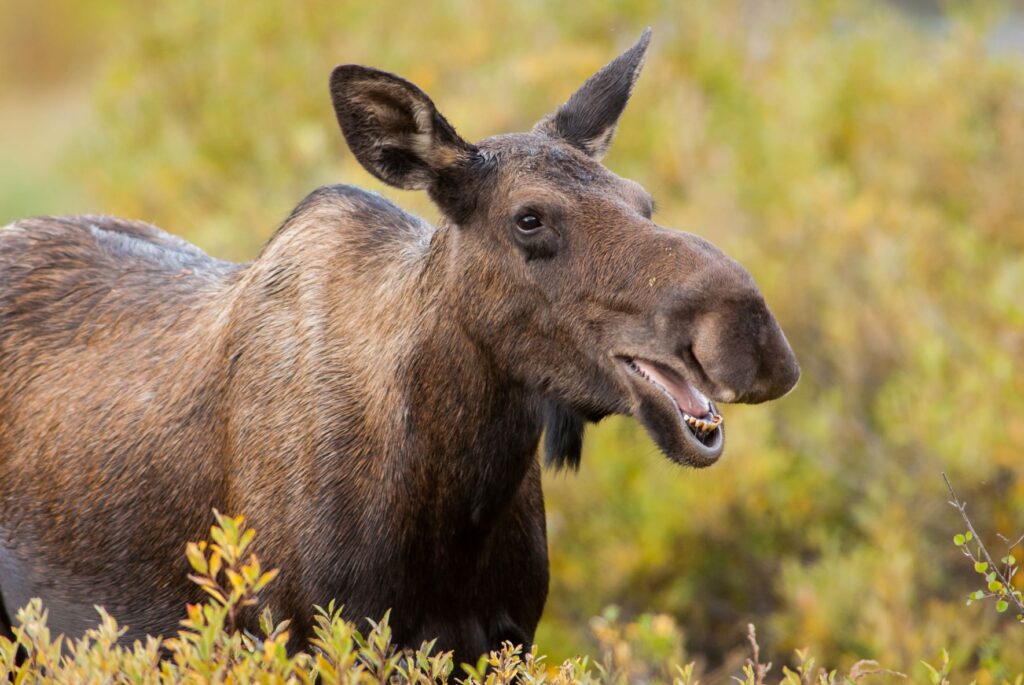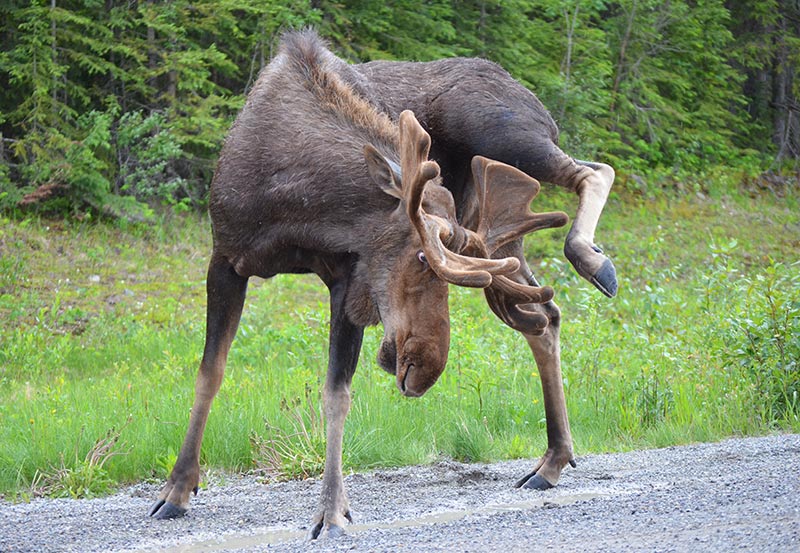British Columbia – Since the inception of the Forest Enhancement Society of BC (FESBC), the Society has partnered with the Habitat Conservation Trust Foundation (HCTF) to achieve its goal to improve forest wildlife habitat. To date, a total of 105 projects have been co-funded throughout the province.
Today, FESBC, in collaboration with HCTF has released an Accomplishments Update, highlighting nine of the 105 co-funded projects focused on maintaining and enhancing important wildlife and their habitats.
“HCTF and FESBC have worked together with others to enhance wildlife habitats for many, many species across British Columbia and we know that the best enhancement projects are those inspired at the grassroots level,” said Dan Buffett, CEO of HCTF. “Local people and communities are experts in delivering projects, as they know their local wildlife, ecology, landscapes, organizations, and circumstances. That’s why we can rely on them to reflect the priorities of communities while supporting the projects that are important.”
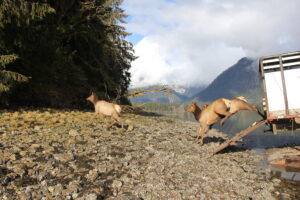
Roosevelt Elk released on the West Coast to improve Mainland populations health under the West Coast Roosevelt Elk Augmentation and Recovery Project, Credit: HCTF 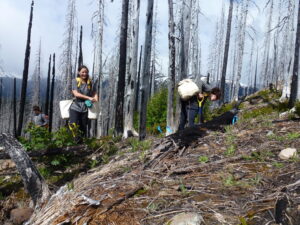
Workers replanting Whitebark Pine saplings along a subalpine ridge in the Skeena Region under the project to restore Whitebark Pine Ecosystems to Enhance Subalpine Bear Habitat, Credit: Sybille Haeussler 
Ministry of Forests researchers attaching a tracking collar to a Mule under the Deer Kootenay Mule Deer Survival Monitoring project, Credit: HCTF. 
The BC Conservation Foundation (BCCF) bringing outreach and education to the public about bat conservation under the Got Bats? B.C. Community Outreach Conservation and Citizen Science Project, Credit: BCCF. 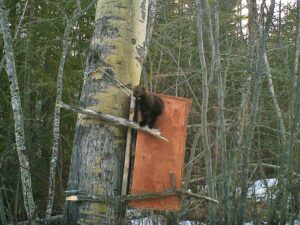
Fisher using an artificial den box installed by researchers under the Fisher Artificial Reproductive Den Box Study, Credit: Larry Davis
The nine projects highlighted in the Accomplishments Update include increasing Fisher habitat stewardship in the forest sector, invasive plant management on the winter ranges for Bighorn Sheep to increase the quality of grasslands, restoring whitebark pine ecosystems damaged by wildfire to improve habitat for bears, and more.
Minister of Forests Katrine Conroy, acknowledged the good work coming out of the FESBC and HCTF partnership and pointed out why this collaboration is crucial.
“The Forest Enhancement Society of BC and the Habitat Conservation Trust Foundation’s partnership delivers on-the-ground projects improving wildlife stewardship and habitat conservation throughout the province. Through increased collaboration, their work is aligned fully with our Together for Wildlife strategy turning data and knowledge into action and results,” noted the Minister. “Partnerships like this are putting us on our path forward to achieve better outcomes for wildlife.”
As of March 2022, FESBC and HCTF together have doubled the funding to over $8 million toward 105 projects.
Steve Kozuki, executive director of FESBC, is pleased with the collaboration.
“Right from the beginning, we knew that partnering with HCTF was the way to go if we wanted to achieve our goals for wildlife habitat enhancement, and FESBC is proud of this partnership. The many past, present, and future projects like these will help ensure that wildlife in British Columbia will flourish for generations to come,” said Kozuki.
The funding for these co-funded projects comes from the Province of British Columbia and from conservation surcharges on hunting, fishing, and other licenses, court fines from wildlife violations, and public donations.
Minister of Environment & Climate Change Strategy, George Heyman highlighted the importance of the partnership and why the investment in the work done by FESBC and HCTF is important.
“British Columbians are increasingly feeling the impacts of the climate crisis. It’s why we’re taking steps to reduce our greenhouse gas emissions and restore sensitive wildlife habitat in forests across B.C. By working together with our Indigenous partners and organizations like the Forest Enhancement Society of BC and Habitat Conservation Trust Foundation, we’re investing in solutions that will protect and enhance our forests for a more secure future,” said Heyman.
To read the full 2022 Fall Accomplishments Update, click here.
About FESBC: the purposes of FESBC are to advance environmental and resource stewardship of B.C.’s forests by: preventing and mitigating the impact of wildfires; improving damaged or low-value forests; improving habitat for wildlife; supporting the use of fibre from damaged and low-value forests; and treating forests to improve the management of greenhouse gases. As of March 2022, FESBC has supported 263 projects valued at $238 million, in partnership with the governments of B.C. and Canada. FESBC would like to gratefully acknowledge the financial support of the Province of British Columbia through the Ministry of Forests.
About HCTF: HCTF is a non-profit charitable foundation investing in the future of British Columbia’s fish, wildlife, and their habitats. HCTF came into existence because its major contributors—hunters, anglers, trappers, and guide-outfitters—were willing to pay a license surcharge for conservation work, going above and beyond what was expected by the government for basic management of wildlife and fish resources.



